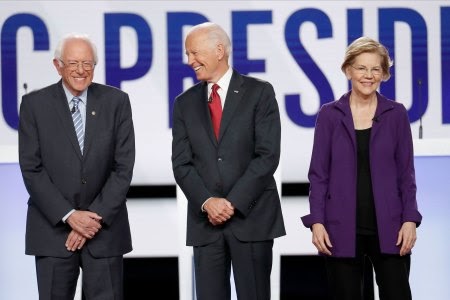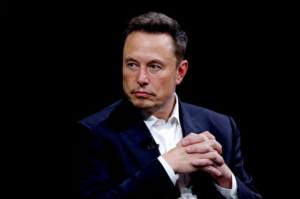What to Expect From Next Week’s Democratic Debate

Mandatory Credit: Photo by John Minchillo/AP/Shutterstock (10445237f) Elizabeth Warren, Bernie Sanders, Joe Biden. Democratic presidential candidate Sen. Bernie Sanders, I-Vt., former Vice President Joe Biden, center, and Sen. Elizabeth Warren, D-Mass., right, stand on stage before a Democratic presidential primary debate hosted by CNN and The New York Times at Otterbein University, in Westerville, Ohio Election 2020 Debate, Westerville, USA - 15 Oct 2019
Courtesy of Rolling Stone
By Jeremy Perillo
February is expected to be an important month for the Democratic presidential candidates, as the Iowa Caucus, New Hampshire primary, and the 8th debate all fall less than two weeks into the month.
The debate will be at Saint Anselm College in Manchester, New Hampshire on February 7, ahead of the New Hampshire primary on February 11. It is not a coincidence that these two events fall so close to each other, as the candidates make one last push to leave an impression on those voting in the primary. It begs the question: Why does New Hampshire matter? Why is there a debate four days before New Hampshire’s primary opens up?
New Hampshire’s importance stems from the fact that it is the first primary to occur throughout the nation, and it has been that way since the late 1970s. It is considered an early measurement in the national mood towards the candidates running for office, and often sets a precedent for how candidates will do throughout the primary process.
It is not uncommon for those candidates who do not do well in the New Hampshire primary, to drop out of the race not long afterward. Of course, those candidates who do well in New Hampshire do not always make it far in the election either.
For example, in 2016 Bernie Sanders swept Hillary Clinton in New Hampshire by roughly 56,332 votes. Despite his success in 23 primaries and caucuses, he threw his support behind Hillary Clinton’s nomination in later July 2019, allowing Clinton to receive the Democratic nomination.
Regardless of how things will look down the line for those who do well next Friday, it will be an interesting development for Democratic candidates. With seven candidates qualifying for the debates and five others who did not qualify, the Democratic field is still crowded one.
With recent polls showing Sanders closing in on Biden’s lead, and others placing Sanders in front of Biden, expect to see the two front runners butt heads more than a couple of times throughout the night. Additionally, lower-tiered candidates may see this debate as their last opportunity to make a lasting impression in a debate before primaries start popping up.
Andrew Yang, for example, was not present at the last debate but was able to qualify for next week’s debate. His struggles with garnering enough support might become more difficult as the field continues to narrow farther into 2020.
Yang, Amy Klobuchar, Tom Steyer, and Pete Buttigieg are all in the same boat; they must take away the attention from the top three candidates to allow themselves to be the talk of the night. If not, their campaigns will likely have a swift end.
With the Iowa caucus being only days before the debate, whoever fairs well may see increased attacks on the debate stage. As they resort to last-ditch efforts to bring themselves up in the polls, desperate candidates may try and focus on the imperfections of their fellow candidates.
Being one of eight, it is hard for next week’s debate to set itself apart from the rest. However, it will be one of the most important in this part of the election process and one that people should not miss. The last-minute debate appearances and platform discussions can make a huge difference as the Democratic party starts the process of choosing a nominee.







